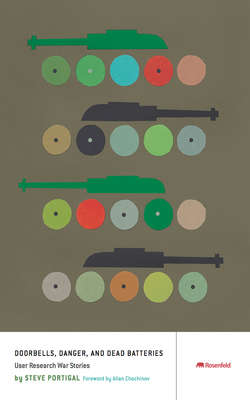Читать книгу Doorbells, Danger, and Dead Batteries - Steve Portigal - Страница 12
На сайте Литреса книга снята с продажи.
Julia Thompson: For Want of a Shoe
ОглавлениеIt all started with a simple question from the dispatcher: “Do you want a call when your taxi arrives?” My nonchalant answer, “No thanks, I should be OK,” was the nail in my coffin. This was my first error in a series of cascading mistakes.
The next morning, I was heading out-of-country for in-home interviews. That night, in an effort to be as prepared as possible, I called to arrange a taxi for an early morning pickup. I hung up the phone and proceeded to pack my bags. I considered carefully what to pack. I visualized my next few days: What would the weather be like? What would be my mode of transportation? What clothing would be appropriate for the work—casual enough to fit into a home environment and dressy enough to fit into an office environment? I was sure that I had considered all the details. Unfortunately, the most important detail, my alarm, was what I missed.
Satisfied with my preparation, I went to bed and slept well. The next morning I awoke feeling refreshed. With birds chirping outside, sunlight filled the room. Yet something felt terribly wrong. What time was it? Why was it so light out? I picked up my phone, checked my alarm, and then checked the time. My stomach fell to the floor. My flight was leaving now.
Sheer panic overtook me. I couldn’t think straight. I had never missed a flight before. I felt like I was going to throw up. I was paralyzed. I had no idea what to do. I grabbed my phone and called our corporate travel agent. It felt like hours as I waited on hold to ask my pressing questions: Could I still make my interview? When was the next flight? Could I fly out of a different airport instead?
The sound of my heartbeat drowned out every noise as I sat there waiting, palms sweating, phone clutched. The agent came back on the line and said there was a flight leaving from another airport in two hours. Could I make it there in time? It’s almost rush hour. It’s an hour’s drive with no traffic. What about parking? Customs? Security? If I took the car, how would my husband get to work? On top of all that, the agent still wasn’t sure whether there was room on the flight.
We decided, together, that I should start driving, and I should stay on the line while she called the airline to confirm availability. I jumped in the car, with my phone on the passenger seat and that awful music taunting me as I continued to wait, on hold. I got about 10 minutes down the road when the agent told me to pull over and go home. That flight wouldn’t be mine. I would settle for another flight, hours later, and hours after my scheduled interview.
Later that day, as my plane came in for its landing, I just felt low. I was tired from the emotional rollercoaster of missing my flight, I was anxious knowing I’d have to tell the people I was working with what had happened, and I was sad that I had missed out on an interview and the opportunity to see firsthand into the life of one of our customers. The only thing saving me was the fact that I was the client, so even though I missed the interview, it still went ahead as scheduled.
The following day I awoke in the right place and at the right time, with a better perspective on life. Our local research partner was gracious enough to include me in an interview that day. I was thankful. I was relieved. But now, that meant there would be four of us attending this interview. Two consultants and two clients: two too many. The consultant had called ahead and confirmed with our interviewee that it would be OK if an additional person (me!) attended the interview. Our interviewee was very accommodating and agreed to have all four of us into her home. I was so preoccupied with resolving my own error that I didn’t consider, until later, how the dynamic of the interview would now be affected.
We all got to the interview, we all walked in, and we all sat down in the chairs offered to us by our interviewee. As everyone was setting up, I started to look around and take note of the environment. I noticed several pairs of shoes neatly arranged by the front door. I looked over at our host, I looked down: bare feet. My eyes darted around the room. I looked down at all our feet. All four of us had our shoes on, laces tied. Bah! We were the worst guests ever. Weren’t we all, as researchers, supposed to notice something so simple but so important?
PHOTO BY JULIA THOMPSON
I spent the next five minutes cursing myself, my missed flight, the totally wrong and overpowering dynamic of four researchers to one customer, and the miss on basic shoe etiquette. I had to shake it off—all the feelings of shame, all the feelings of doubt—and I had to focus. I had to be in the moment. I had to get the most I could out of the interview, and I had to show the interviewee the respect she deserved.
It ended up being a great discussion. It was, by no means, a textbook in-context interview, but we had a nice dynamic emerge nonetheless. My story is not one of a single epic fail, but instead of a series of errors with a cascading effect. “For want of a nail the shoe was lost, for want of a shoe the horse was lost . . . ” Here, we had not for want of a shoe, we had too many.
